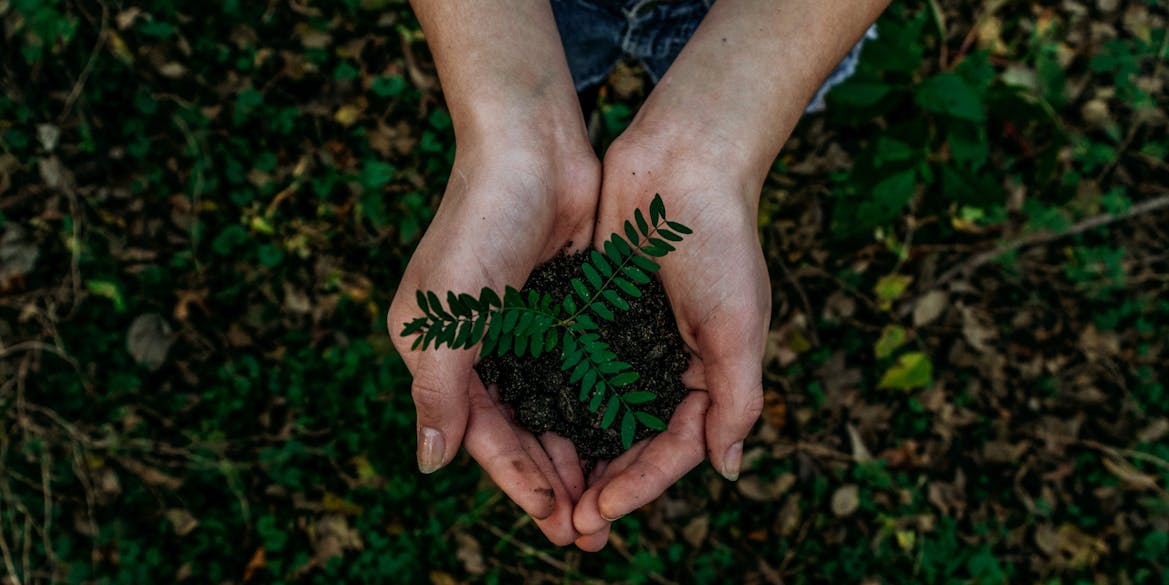August 19, 2021
The Best Sustainability Books for Becoming More Eco-Friendly
Anyone can be an environmental activist - and it's never too late to become one. Here are the 5 best books for learning how to be a little kinder to our planet.

We can no longer ignore the impact of global warming on our planet.
From agriculture shortages to junk in our oceans to the extinction of animal species, scary is an understatement. But just as we can get educated on these frightening changes, we can just as easily learn how to combat it.
Have you tried going zero waste? Or shopping brands that offer recyclable, friendly packaging? It's possible to adopt an eco-friendly lifestyle on an individual level, while we fight for corporate change at the same time. It's never too late to decrease your carbon footprint, and making even the smallest of changes to your lifestyle can help do some good. Here's our pick of 6 books that teach us why (and how) we can show our planet a bit of love.
Animal, Vegetable, Miracle - Barbara Kingsolver
On Uptime
Animal, Vegetable, Miracle offers practical ways to improve your health and the environment by learning how to garden, cook, and eat more fruits and veg.
You can ask yourself endless questions about the food on your plate - "Where did it come from? Who grew it? How did it get to my supermarket?" Getting those answers feels overwhelming. Sure, you can buy organic. Or better yet, what if your garden could be the source?
Kinsgsolver tells the story of her own family who decided to dramatically change their lives by creating a sustainable home - only eating locally and growing their own food for a year. She encourages all of us, even if we can’t grow everything we eat, to start doing what we can to source our own food.
The Omnivore's Dilemma - Michael Pollan
On Uptime
The Omnivore’s Dilemma explains the paradox of the food choices we face today, how the industrial revolution changed the way we eat, and which food choices are the most ethical, sustainable, and environmentally friendly.
 Don’t eat anything your great-grandmother wouldn’t recognize as food.
Don’t eat anything your great-grandmother wouldn’t recognize as food.Today, everything is available to us, all the time, wherever we are. So, what do we eat to stay healthy, make economic choices, and not hurt the environment? Michael Pollan helps us answer this now highly complicated question.
Pollan unpacks:
- A lot of our environmental problems around food today started with the production of corn
- Why food labelled as 'organic' isn't always as good for us as we think it is
- Why buying food from local sources will help us fix many of our problems
This Changes Everything - Naomi Klein
On Uptime
Naomi Klein, a renowned journalist, filmmaker, and activist has increasingly focused on this inaction in the face of environmental disaster. In her book, she outlines how our growth-driven economic system is fundamentally incompatible with the planet’s natural limits. Yet beyond a bleak accounting of the problem, Klein draws on the struggles and triumphs of modern history to point the way towards a more sustainable, healthy, and equitable future.
Here are 3 key insights from the book:
- The world has been slow to deal with climate change because doing so requires a completely new economic system
- Mass protest movements appear to be the only effective obstacle to continued global heating in the name of economic growth
- The abolition of slavery is the most relevant precedent to the climate justice movement - offering lessons, inspiration and hope
The Uninhabitable Earth - David Wallace-Wells
On Uptime
A daunting read, but an important one nonetheless, this book explains how, due to our complacency and negligence, the Earth will soon become uninhabitable for humans unless we each do our part to turn the tide.
 We think of climate change as slow, but it is unnervingly fast. We think of the technological change to avert it as fast-arriving, but it is deceptively slow judged by how soon we need it.
We think of climate change as slow, but it is unnervingly fast. We think of the technological change to avert it as fast-arriving, but it is deceptively slow judged by how soon we need it.Here are 3 key insights from the book:
- The Paris climate agreement goals were hopelessly optimistic, and too little, too late
- Climate disasters act as chain reactions that trigger further global warming
- Climate change has left us on the verge of a global health crisis through disease and famine
Braiding Sweetgrass - Robin Wall Kimmerer
Braiding Sweetgrass offers some great ways for all of us to take better care of and be more grateful for our planet, by explaining the way that some Native American tribes view and take care of it.
Author Robin Wall Kimmerer gives us a unique view on how to care for Mother Nature. As a Native American and environmental biologist, she brings her perspective on how to face our environmental challenges. She teaches us to treat the Earth as a beloved family member, rather than a resource we can take freely from.
Braiding Sweetgrass unpacks why:
- Native American culture emphasises respect and care for nature
- We need to start working in harmony with nature if we want it to be sustainable
- Teaching the next generation about respect and gratitude is key in protecting the Earth’s future
After learning more about these books, what do you think your environmental activism will look like? To unpack these lessons in full, check out our selection of must-read books on climate change and the environment on Uptime.
Recommended















